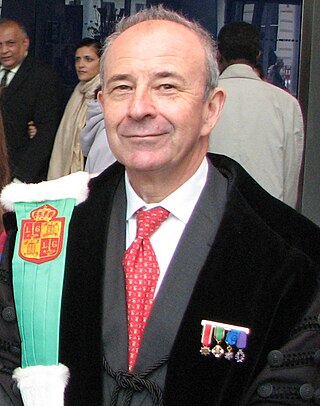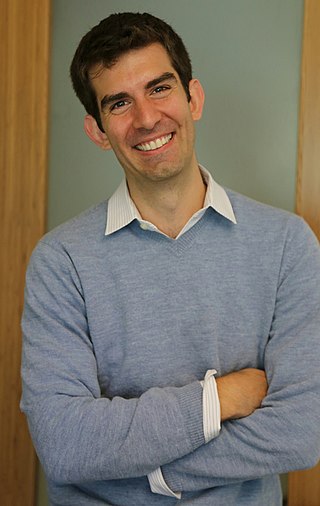The Association for Computing Machinery (ACM) is a US-based international learned society for computing. It was founded in 1947 and is the world's largest scientific and educational computing society. The ACM is a non-profit professional membership group, reporting nearly 110,000 student and professional members as of 2022. Its headquarters are in New York City.

Peter James Denning is an American computer scientist and writer. He is best known for pioneering work in virtual memory, especially for inventing the working-set model for program behavior, which addressed thrashing in operating systems and became the reference standard for all memory management policies. He is also known for his works on principles of operating systems, operational analysis of queueing network systems, design and implementation of CSNET, the ACM digital library, and codifying the great principles of computing. He has written numerous influential articles and books, including an overview of fundamental computer science principles, computational thinking, and his thoughts on innovation as a set of learnable practices.

Jeffrey Peter Buzen is an American computer scientist in system performance analysis best known for his contributions to queueing theory. His PhD dissertation and his 1973 paper Computational algorithms for closed queueing networks with exponential servers have guided the study of queueing network modeling for decades.
Kronos is an operating system with time-sharing capabilities, written by Control Data Corporation in 1971. Kronos ran on the 60-bit CDC 6000 series mainframe computers and their successors. CDC replaced Kronos with the NOS operating system in the late 1970s, which were succeeded by the NOS/VE operating system in the mid-1980s.
Donald Fred Towsley is an American computer scientist who has been a distinguished university professor in the College of Information and Computer Sciences at the University of Massachusetts Amherst.
The Intel Personal SuperComputer was a product line of parallel computers in the 1980s and 1990s. The iPSC/1 was superseded by the Intel iPSC/2, and then the Intel iPSC/860.

Sami Erol Gelenbe, a Turkish and French computer scientist, electronic engineer and applied mathematician, pioneered the field of Computer System and Network Performance. Currently Professor in the Institute of Theoretical and Applied Informatics of the Polish Academy of Sciences, he is also an Associate Researcher in the I3S Laboratory and Abraham de Moivre Laboratory. Fellow of several National Academies, he Chairs the Informatics Section of Academia Europaea since 2023. His previous Professorial Chairs include the University of Liège (1974-1979), University Paris-Saclay (1979-1986), University Paris Descartes (1986-2005), NJIT (1991–93), ECE Chair at Duke University (1993-1998), University Chair Professor and Director of EECS, University of Central Florida (1998-2003), and Dennis Gabor Professor and Head of Intelligent Systems and Networks, Imperial College (2003-2019).
In queueing theory, a discipline within the mathematical theory of probability, mean value analysis (MVA) is a recursive technique for computing expected queue lengths, waiting time at queueing nodes and throughput in equilibrium for a closed separable system of queues. The first approximate techniques were published independently by Schweitzer and Bard, followed later by an exact version by Lavenberg and Reiser published in 1980.
Hari Balakrishnan is the Fujitsu Professor of Computer Science and Artificial Intelligence in the Department of Electrical Engineering and Computer Science at MIT, and the Co-founder and CTO at Cambridge Mobile Telematics.
In queueing theory, a discipline within the mathematical theory of probability, the flow-equivalent server method is a divide-and-conquer method to solve product form queueing networks inspired by Norton's theorem for electrical circuits. The network is successively split into two, one portion is reconfigured to a closed network and evaluated.

Kathryn S. McKinley is an American computer scientist noted for her research on compilers, runtime systems, and computer architecture. She is also known for her leadership in broadening participation in computing. McKinley was co-chair of CRA-W from 2011 to 2014.
Margaret Martonosi is an American computer scientist who is currently the Hugh Trumbull Adams '35 Professor of Computer Science at Princeton University. Martonosi is noted for her research in computer architecture and mobile computing with a particular focus on power-efficiency.

Adam Wierman is Professor of Computer Science in the Department of Computing and Mathematical Sciences at the California Institute of Technology. He is known for his work on scheduling (computing), heavy tails, green computing, queueing theory, and algorithmic game theory.
Devavrat Shah is a professor in the Electrical Engineering and Computer Science department at MIT. He is director of the Statistics and Data Science Center at MIT. He received a B.Tech. degree in computer science from IIT Bombay in 1999 and a Ph.D. in computer science from Stanford University in 2004, where his thesis was completed under the supervision of Balaji Prabhakar.
Raphael "Raphi" Rom is an Israeli computer scientist working at Technion – Israel Institute of Technology.
Mary Katherine Vernon is an American computer scientist who works as a professor of computer science and industrial engineering at the University of Wisconsin–Madison. Her research concerns high-performance computer architecture and streaming media.
RIPE Atlas is a global, open, distributed Internet measurement platform, consisting of thousands of measurement devices that measure Internet connectivity in real time.
Mark Crovella is an American computer scientist and Professor at Boston University. His research focuses on computer networks as well as data science. Much of his work has focused on improving the understanding, design, and performance of parallel and networked computer systems, mainly through the application of measurement, data mining, statistics, and performance evaluation. In the computer science arena, he has focused on the analysis of social, biological, and communication networks. He is co-author of the first text on Internet Measurement, Internet Measurement: Infrastructure, Traffic, and Applications. In 2010 he was one of the inaugural winners of the ACM SIGMETRICS Test of Time awards, which recognize "an influential performance evaluation paper whose impact is still felt 10-12 years after its initial publication." He was named ACM Fellow in 2010, and Fellow of the Institute of Electrical and Electronics Engineers (IEEE) in 2012, in both cases for contributions to the measurement and analysis of networks and distributed systems. He served as chair of ACM SIGCOMM from 2007 to 2009, and he served as Chair of the Department of Computer Science at Boston University from 2013 to 2018.
Hui Zhang is a Chinese-American computer scientist and professor at Carnegie Mellon University, and an entrepreneur who co-founded Conviva.
Can Emre Koksal is an electrical engineer, computer scientist, academic, and entrepreneur. He is the Founder and CEO of Datanchor, and a professor of Electrical and Computer Engineering at Ohio State University.




